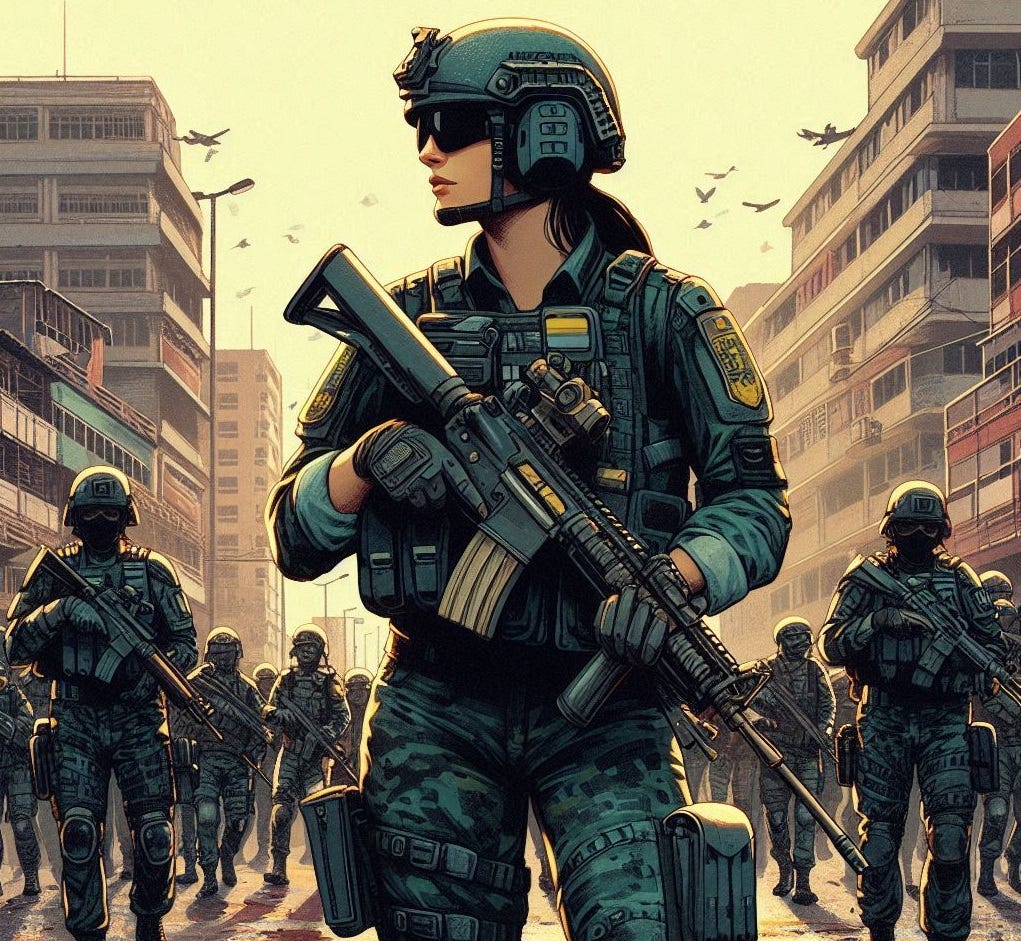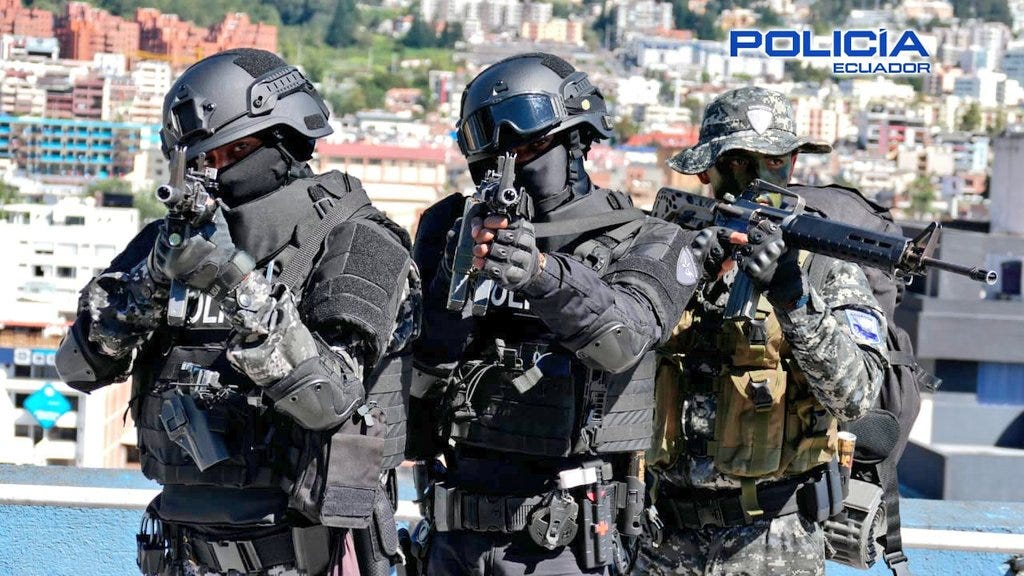The Bukele Clones are not faring well
Copycat crackdowns by security forces in Honduras and Ecuador have failed to reduce growing criminality
This is an installment of the “Ship’s Log” series, more personal entries or analyses on the beats we cover for paid subscribers.
If you haven’t signed up for a paid subscription, we urge you to consider doing so. We have plans that start at just $5/month and the resources help us continue bringing you the stories that most big media companies miss.
If you have, thank you, and read on!
Since El Salvadoran President Nayib Bukele imposed a “temporary” state of emergency that curtails civil rights and expanded police powers in 2022, he has won re-election in a landslide, despite re-election being Constitutionally prohibited under Salvadoran law, and projected an image of ruthless efficiency on the part of security forces in combating criminality.
Crime in the country, which was once the most dangerous in the Americas, has indisputably plummeted, (though homicide statistics from the Salvadoran government are also misleading, more on that below). Bukele’s gains against crime have inspired copycat policies across the region.
Politicians in Ecuador and Honduras especially have embraced “the Bukele strategy”, deciding that using authoritarian crackdowns in battling organized criminal groups merits the respective costs to democratic process and civil rights.
However, the results of copycat policies in Honduras and El Salvador have been very different from the country they are imitating. The Bukele copycats are not doing well.
Ecuador
Ecuador was the most dangerous country in Central or South America in 2023, with a homicide rate of 44.5 per 100,000 — a 74.5% increase over the previous year. The country has experienced a wave of violent crime in recent years. The government has implemented a series of authoritarian measures over the last two administrations, culminating in emergency decrees that have given exceptional powers to police and prosecutors.
Ecuadorian President Daniel Noboa, who took office in November 2023, has continued the hard-line policies of his predecessor. He won a campaign plagued by violence, which culminated in the assassination of a presidential candidate.
The country, until recently, had been a relative oasis of security in Latin America, but inroads by sophisticated criminal groups organized around cocaine smuggling in recent years have changed that and set off a wave of violence, a phenomenon that has been centered in the coastal city of Guayaquil.
In response, police and military forces have established checkpoints, conducted warrantless searches as well as raids resulting in mass arrests in poor urban areas, and suspended some of the civil rights of those accused of working with criminal groups.
But the crackdowns by security forces have yielded mixed results at best. The government this week pointed to data that shows a 28% reduction in violent deaths in the first 4 months of the year compared to the same period in 2023, suggesting that these measures have had some positive impact.
However, other crimes, such as kidnappings and extortion, have sky-rocketed during the same period, and cocaine smuggling has been largely unaffected. Human rights groups have also pointed to violence and abuses by state forces as part of security operations. The attorney general’s office is currently investigating reports of eight extrajudicial killings by the police during the most recent state of emergency.
Ecuador borders the largest cocaine-producing countries in the world, Colombia, Peru and Bolivia. Unlike in El Salvador, where the government struggles against gangs funded via extortion, the Ecuadorian government is facing off against incredibly sophisticated, well-armed, and well-connected international criminal groups, and aggressive security strategies do little to address the underlying causes of increasing violence.
Ecuador is also much larger than El Salvador, both in terms of geography and population.
Homicide Rate Change in Ecuador Between 2023 and 2022: +74.5%
Crackdowns alone have not sufficed. And as much as Naboa would like to become a South American Bukele, unlike the self-proclaimed “coolest dictator in the world”, he has not been able to systematically destroy the checks and balances that make Ecuador a democracy, much to the benefit of Ecuadorian citizens.
The Latin American Post, this week in an editorial summed up the situation succinctly. “Ecuador’s heavy reliance on security forces reflects an urgent need to address the immediate threats posed by organized crime.” But that approach must be paired with more “comprehensive approaches that include social and economic development initiatives to address the root causes of crime and violence.”
Honduras
On 6 December 2022, Honduran President Xiomara Castro implemented a state of exception in several neighborhoods of Honduras’ capital, Tegucigalpa, and the second-largest city, San Pedro Sula, as part of a plan to fight criminal groups and extortion.
Castro won the presidency after a campaign promising to fight corruption, fortify human rights, and implement community policing programs. She has done none of those. And as her government has grown more unpopular, she has extended policies granting exceptional powers to security forces. The “temporary” state of exception is now in force in 158 of the country’s 298 municipalities.
Criminal groups have long held considerable power in Honduras, which is a key transit point for international drug trafficking. They have deeply infiltrated state institutions, as shown by widespread collusion between organized crime and high-level politicians, most notoriously Castro’s predecessor Juan Orlando Hernández, who was convicted on drugs and weapons charges in the United States.
Homicide Rate Change Between 2023 and 2022: -13.0%
Despite the security measures violence targeting civilians continued unabated throughout 2023 and riots in the country’s notoriously overcrowded prisons has continued.
Although the murder rate in the urban centers of Tegucigalpa and San Pedro Sula has dropped slightly, rural areas have become considerably more dangerous, and extortion has become more commonplace across the country. Coca cultivation has also grown since Castro took office.
Castro has put prisons under military control and announced plans to build a high-security complex on the Swan Islands, which could deprive prisoners of contact with their relatives and lawyers.
According to ACLED, an NGO that monitors global conflict, the state of exception has “failed to adequately respond to the underlying drivers of violence or systemic corruption within police and judicial institutions.”
El Salvador
Progress against criminal gangs in El Salvador has undeniably been substantive. Both extortion and murder rates have fallen considerably and citizens report feeling safer on city streets across the country.
But the improvements come with some serious caveats that Bukele does not mention in public announcements. Unlike most other countries, El Salvador does record deaths at the hands of security forces to be intentional homicides. Nor are those killed in prisons included in official statistics.
NGOs in El Salvador have recorded more than 200 deaths of prisoners since the state of exception was declared, only 6% of which had been convicted of being members of criminal gangs.
In addition, criminal groups may now be “disappearing” people rather than killing them publicly. With no body, no homicide is recorded.
The Central American University’s (UCA) Observatory of Human Rights has in the past criticized official data, saying violent deaths are “highly underreported” and government figures “not truthful.”
A recent report from the International Crisis Group shows that drug-related homicide rates had already fallen by 60 percent before Bukele’s massive crackdown in 2022.
But in addition to doctored numbers, the crackdown has also come with problems for civil society, as El Salvador drifts ever closer to authoritarianism.
Bukele has stifled political opposition, imposed presidential control over the judicial, executive, and legislative branches, muzzled the media, and dismantled or run roughshod over key aspects of Constitutional law that limit presidential power. Since Bukele was first elected in 2019 El Salvador has slipped to the bottom 25 percent of countries worldwide in terms of democracy, and surpassed the U.S. as the country with the highest incarceration rate in the world— and the vast majority of those detained have been convicted of no crime.
The U.S. recently imposed sanctions on some members of Bukele’s party for corruption, a condition widely assumed to be widespread among El Salvador’s ruling class.
Countries who are trying to copy “the Bukele model” on security have been unable to reproduce its results, even taking into account the flaws in reporting. The differences stem from many reasons, not least of which is that gangs in El Salvador rely on extortion for income and lack the influence, firepower, and sophistication of international criminal groups operating in Ecuador and Honduras.
And for some residents, they have merely traded one corrupt element for another. As abuses by security forces increase, fear of police has replaced fear of criminal groups.









Far too serious topic for this, but still, we couldn't prevent a chuckle at “Ecuador is also much larger than Ecuador”
Thank you for the in depth information!